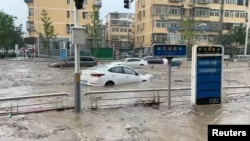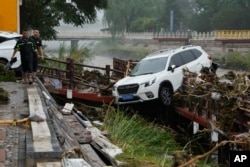Several days of torrential rain caused by the remnants of Typhoon Doksuri have hit Beijing with one of its worst storms in over a decade, triggering landslides and floods that swept away cars and destroyed roads.
The flooding has affected more than 44,000 people in 13 districts of the city, and more than 120,000 people have been evacuated. By Tuesday morning, at least 20 people had died and 27 others were reported missing, according to The Associated Press and Reuters.
Mentougou District and Fangshan District, the hardest-hit areas, experienced power outages. According to the National Early Warning Center, Mentougou had received 470 millimeters (roughly 18.5 inches) of rain by Tuesday morning, causing the nearby Yongding River to inundate several villages.
Some roads collapsed, and the asphalt pavement was broken into pieces. The entire Dayu South Road was flooded, trapping many vehicles.
Local residents complained that the authorities cared only about prestige projects and neglected basic disaster prevention measures.
Mr. Ye, a resident of Mentougou since 2008 who asked that his full name not be published for fear of retaliation, told VOA by text message that as the rain intensified Monday morning, a large amount of rainwater poured down a nearby mountainside.
"About six or seven o'clock, a lot of water slides down from the top of the mountain," he said. "This is the first time I have seen such heavy rain in the many years I have been in Mentougou."
Many utility poles and transformers in Mentougou were damaged, affecting power supply and communication in some areas.
Early Tuesday, the People's Liberation Army dispatched four transport helicopters to Mentougou and other locations to airdrop rescue supplies, including food and rain gear, to trapped trains and to transfer patients to safe areas.
Zhai Yanmin, a Beijing resident, lives only about a 10-minute drive from Mentougou. He told VOA by text message that the area is paralyzed.
"Water, electricity and gas are all shut off in Mentougou," Zhai said. "There is no [wireless communication] reception, and all the buses stopped running. Many local villages are built on slopes, with only on-street parking. Because of the floods, cars parked in front of the houses are all swept away."
In recent years, Mentougou authorities have devoted themselves to promoting the district's tourism industry and claimed to attach great importance to improving infrastructure. Zhai said the torrential rain allowed the outside world to see a side of Mentougou that was not well known.
"The drainage ditches are too small and can only drain light rain, not heavy rain," he said, adding that many roads had collapsed or sunk, "which proves that the roads are jerry-built projects because it hasn't been long since they were built."
The damage in the neighboring Fangshan District is equally severe, with roads turned into torrents. The state broadcaster CCTV calculated that the flow rate under the Yongding River Bridge was 3,700 cubic meters (roughly 130,700 cubic feet) per second, making it the worst flood in 50 years.
"At the very least, you should have temporary measures to drain the water away wherever it is flooded the worst. At the very least, you can't let the water flood the houses of ordinary people and the roads," Zhai said. "Mentougou has been doing prestige projects and didn't pay attention to these flood drainage and prevention measures."
Ni Yulan moved into her new home in Tongzhou District in southeast Beijing just two months ago. She told VOA by text message that her building is leaking.
"The water keeps leaking in from the ceiling near the door to the balcony," Ni said. "We use dishes to catch the water and have to empty the dishes many times a day. When there is heavy rain outside, it's like medium rain inside. The room could be flooded if you are not careful."
In anticipation of the rainstorm, authorities released water on Saturday from the Beijing Zhaitang Reservoir on the upper reaches of the Yongding River so it had room to retain more of the floodwaters. It was the first time that has been done since the reservoir was built in 1998.
The severity of the flooding took the Chinese capital by surprise. Beijing usually has dry summers but had a stretch of record-breaking heat this year.
This story originated in VOA's Mandarin Service. Some information is from The Associated Press.






